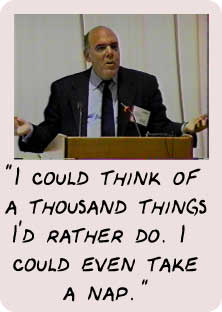|
|
Katalina Groh, Larry Prusak: Some of the world's leading thinkers |
| Storytelling: Organizational Perspective: Larry Prusak |
 |
Social
capital and trust
The last thing I wanted
to talk about in terms of enablers, things that really work well, is the
social capital issue. Iíve just finished a book on social capital, a subject
I learned about, by the way, by doing a lot of work at the World Bank.
Social capital can be defined as investments made Ė investments, thatís
why itís capital Ė to facilitate cooperative activities in organizations
that have a measurable rate of return.
|
| When the Bank and companies
just invest in infrastructure, what do they get? Well, they get infrastructure.
But if they invest in changing behaviors, in ways of learning, in understanding
new ways of working together that can enhance cooperation, you get a lot
more. The infrastructure works out. Thatís why I am so deadly, I
sometimes speak in hyperbolic terms to make a point, but thatís why I dislike
so much the emphasis on IT in knowledge management, because it drove out,
and it still does, it drives out thinking about what really counts, which
is people knowing things, sharing what they know, and working with what
they know, because people tend to think in the U.S. Ė itís less so in Europe
and Asia Ėthat infrastructure equals results. It does if you are putting
in an ATM machine. It doesnít in most other things.
Trust So social capital: what
are some of the drivers of it when I say itís an important issue. Trust.
Nothing happens if you donít trust people. Trust is the greatest lubricant
for corporate efficiency. Itís even better than information. Why should
anyone do anything with anyone else, if they donít trust them? And if you
donít trust people, what do you do in the absence of trust? In organizations,
forget about countries, thatís another talk. With an organization, what
do you do when you donít trust people? You bargain, you negotiate, and
you monitor. Constant monitoring, constant negotiation, constant
bargaining. That takes a lot of time and money. And itís not innovative
or useful activities. Itís boring. Itís demeaning. And basically, itís
worthless.
|
| Books and videos on storytelling *** In Good Company : How Social Capital Makes Organizations Work by Don Cohen, Laurence Prusak (February 2001) Harvard Business School Press *** The Social Life of Information, by John Seely Brown, Paul Duguid (February 2000) Harvard Business School Press *** The Springboard : How Storytelling Ignites Action in Knowledge-Era Organizations by Stephen Denning (October 2000) Butterworth-Heinemann *** The Art of Possibility, a video with Ben and Ros Zander : Groh Publications (February 2001) |
| The views expressed on this website are those of the authors, and not necessarily those of any person or organization |
| Site optimized in 800x600: webmaster CR WEB CONSULTING |
|
|
|
|